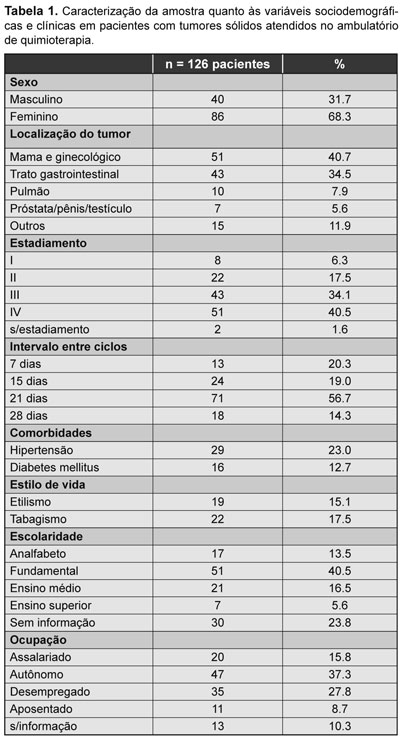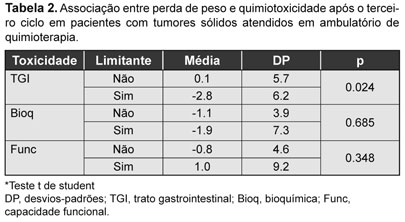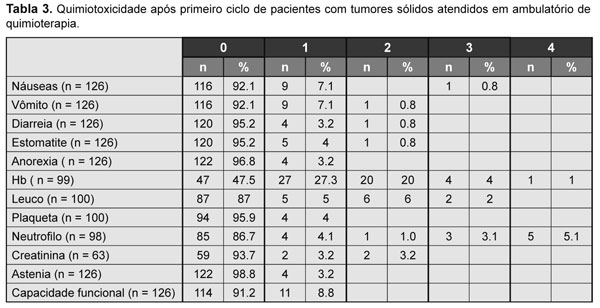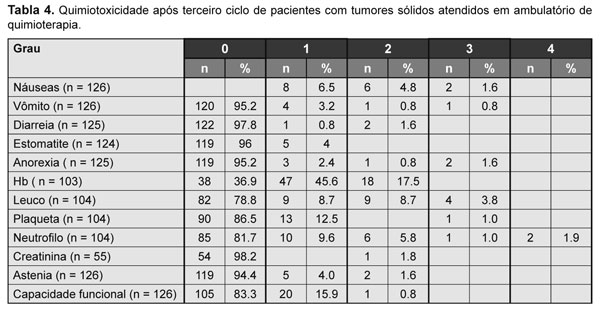 Bibliografía del artículo
Bibliografía del artículo
1. Ministério da Saúde. Glossário temático controle de câncer: projeto de terminologia da saúde. Brasília, Brasil; 2013.
2. Instituto Nacional de Câncer José Alencar Gomes Da Silva. Estimativa 2016: incidência de câncer no Brasil. Rio de Janeiro: INCA, Brasil; 2016.
3. Instituto Nacional de Câncer José Alencar Gomes Da Silva. Registros hospitalares de câncer: planejamento e gestão / Instituto Nacional de Câncer. 2° ed. Rio de Janeiro: INCA; 2010.
4. Isenring E, Elia M. Which screening method is appropriate for older cancer patients at risk for malnutrition? Nutrition 31:594-597, 2015.
5. Bozzetti F. Why the oncologist should consider the nutritional status of the elderly cancer patient. Nutrition 31:590-593, 2015.
6. Prado CM, Lieffers JR, Mccargar LJ, Reiman T, Sawyer MB, Martin L, et al. Prevalence and clinical implications of sarcopenic obesity in patients with solid tumours of the respiratory and gastrointestinal tracts: a populationbased study. Lancet Oncol 9(7):629-635, 2008.
7. Ministério da Saúde. Protocolos do Sistema de Vigilância Alimentar e Nutricional - SISVAN na assistência à saúde. Brasília, Brasil; 2008.
8 National Cancer Institute. Common Toxicity Criteria, Version 2.0. June 1, 1999.
9. Hourdequin KC, Schpero WL, McKenna DR, Piazik BL, Larson RJ. Toxic effect of chemotherapy dosing using actual body weight in obese versus normal-weight patients: a systematic review and meta-analysis. Ann Oncol 24:2952-2962, 2013.
10. Barba M, Pizzuti L, Sperdutti K. Body mass index and treatment outcomes in metastatic breast cancer patients treated with Eribulin. J Cell Physiol 1-21, 2015.
11. Rock CL, Demark-Wahnefried W. Nutrition and survival after the diagnosis of breast cancer: a review of the evidence. J Clin Oncol 20:3302-3316, 2002.
12. Windschwendter P, Frie TWP, Schewentner L, Degregori N. The influence of obesity on survival in early, high-risk breast cancer: results from the randomized SUCCESS A trial. Breast Cancer Res 17:129, 2015.
13. Atalay C, Kuçuk AI. The impact of weight gain during adjuvant chemotherapy on survival in breast câncer. Ulus Cerrahi Derg 31:124-127, 2015.
14. Lee DW, Han SW, Cha Y, Lee KH, Kim TY, Oh DY, et al. Prognostic influence of body mass index and body weight gain during adjuvant FOLFOX chemotherapy in Korean colorectal cancer patients. BMC Cancer 15:690, 2015.
15. Prado CM, Baracos V, Mccargar LJ, Reiman T, Mourtzakis KE. Body composition as an independent determinant of 5-fluorouracil-based chemotherapy toxicity. Clin Cancer Res 13:3264-3268, 2007.
16. Qiu M, Zhou Y, Jin Y, Zi-xian W, et al. Nutrition support can bring survival benefit to high nutrition risk gastric cancer patients who received chemotherapy. Support Care Cancer 23:1933-1939, 2015.
17. Lohr L. Chemotherapy-induced nausea and vomiting. Cancer J 4:85-93, 2008.
18. Hesked PJ, Drews RE, Poplack, DG, Savarese DMF. Prevention and treatment of chemotherapy-induced nausea and vomiting. Uptodate: Sep 14, 2015.
19. Hesketh PJ. Chemotherapy-induced nausea and vomiting. N Engl J Med 358:2482, 2008.
20. Young J, Simmons JW. Chemotherapeutic Medications and Their Emergent Complications. Emerg Med Clin N Am 32:563-578, 2014.
21. Gurney H. How to calculate the dose of chemotherapy. Br J Cancer 86(8):1297-1302, 2002.
22. Rodgers GM, Becker PS, Blinder M, et al. Cancer- and chemotherapy-induced anemia. J Natl Compr Canc Netw 10:628-653, 2012.
23. Groopman JE, Itri LM. Chemotherapy-induced anemia in adults: incidence and treatment. J Natl Cancer Inst 91(19):1616-1634, 1999.
24. Schiffer CA, Anderson KC, Bennett CL, et al.; for the American Society of clinical Oncologist (ASCO) Platelet Transfusion Expert Panel. Platelet transfusion for patients with cancer: clinical practice guideline of the American Society of Clinical Oncology. J Clin Oncol 19(5):1519-1538, 2001.
25. Su Z, Mao YP, Ouyang PY, Tang J, et al. Leucopenia and treatment efficacy in advanced nasopharyngeal carcinoma. BMC Cancer 15:429, 2015.
26. Gurney H. How to calculate the dose of chemotherapy. Br J Cancer 86(8):1297-1302, 2002.
27. Brandberg Y. Quality of life in women with breast cancer during the first year after random assignment to adjuvant treatment with marrowsupported high-dose chemotherapy with cyclophosphamide, thiotepa, and carboplatin or tailored therapy with fluorouracil, epirubicin, and cyclophosphamide: scandinavian breast group study 9401. J Clin Oncol 21(19):3659-3664, 2003.
28. Mayers C, Panzarella T, Tannock IF. Analysis of the prognostic effects of inclusion in a clinical trial and of myelosuppression on survival after adjuvant chemotherapy for breast carcinoma. Cancer 91(12):2246-2257, 2001.
29. Sunaga T, Suzuki S, Kogo M, Kurihara T, Kaji S, Koike N, et al. The association between neutropenia and prognosis in stage III colorectal cancer patients receiving adjuvant chemotherapy. Eur J Cancer Care 23(3):394-400, 2014.
30. Shitara K, Matsuo K, Takahari D, Yokota T, Inaba Y, Yamaura H, et al. Neutropaenia as a prognostic factor in metastatic colorectal cancer patients undergoing chemotherapy with first-line FOLFOX. Eur J Cancer 45(10):1757-1763, 2009.
31. Shitara K, Matsuo K, Takahari D, Yokota T, Shibata T, Ura T, et al. Neutropenia as a prognostic factor in advanced gastric cancer patients undergoing second-line chemotherapy with weekly paclitaxel. Ann Oncol 21(12):2403-2409, 2010.
32. Nakata B, Tsuji A, Mitachi Y, Yamamitsu S, Hirata K, Takeuchi T, et al. Moderate neutropenia with S-1 plus low-dose cisplatin may predict a more favourable prognosis in advanced gastric cancer. Clin Oncol-Uk 18(9):678-683, 2006.
33. Jang SH, Kim SY, Kim JH, Park S, Hwang YI, Kim DG, et al. Timing of chemotherapy-induced neutropenia is a prognostic factor in patients with metastatic non-small-cell lungcancer: a retrospective analysis in gemcitabine-plus-platinum-treated patients. J Cancer Res Clin Oncol 139(3):409-417, 2013.
34. Di Maio M, Gridelli C, Gallo C, Shepherd F, Piantedosi FV, Cigolari S, et al. Chemotherapy-induced neutropenia and treatment efficacy in advanced non-small-cell lung cancer: a pooled analysis of three randomised trials. Lancet Oncol 6(9):669-677, 2005.
35. Miyoshi N, Yano M, Takachi K, Kishi K, Noura S, Eguchi H, et al. Myelotoxicity of Preoperative Chemoradiotherapy Is a Significant Determinant of Poor Prognosis in Patients With T4 Esophageal Cancer. J Surg Oncol 99:302-306, 2009.
36. Driessen CM, Kleine-Bolt KM, Vingerhoets AJ, et al. Assessing the impact of chemotherapy-induced peripheral neurotoxicity on the quality of life of cancer patients. Support Care Cancer 20(4):877-881, 2012.
37. Basch E, Bennett A, Pietanza MC. Use of patient-reported outcomes to improve the predictive accuracy of clinician-reported adverse events. J Natl Cancer Inst 103:1808-1810, 2011.
38. Di Maio M, Gallo C, Leighl NB, Piccirillo, MC, et al. Symptomatic Toxicities Experienced During Anticancer Treatment: Agreement Between Patient and Physician Reporting in Three Randomized Trials. J Clin Oncol 33:910-915, 2015.
39. Petersen MA, Larsen H, Pedersen L, et al. Assessing health-related quality of life in palliative care: Comparing patient and physician assessments. Eur J Cancer 42:1159-1166, 2006.
40. Basch E, Iasonos A, McDonough T, et al. Patient versus clinician symptom reporting using the National Cancer Institute Common Terminology Criteria for Adverse Events: Results of a questionnairebased study. Lancet Oncol 7:903-909, 2006.




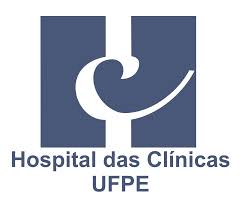
 Artículos originales> Expertos del Mundo>
Artículos originales> Expertos del Mundo> Enviar correspondencia a:
Enviar correspondencia a: